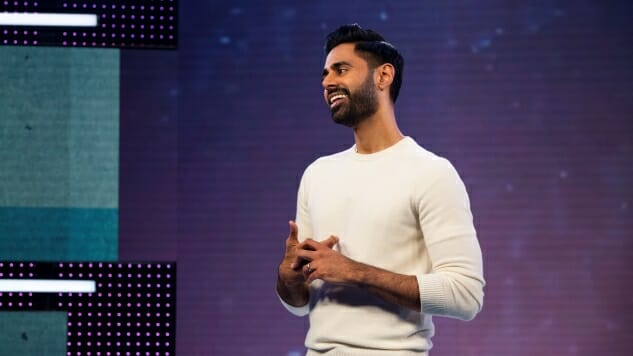Why Hasan Minhaj’s Patriot Act Is Important for Middle Eastern and Central Asian Americans
Photo by Cara Howe, courtesy of Netflix
At a time when almost all news from the White House sounds like it’s straight from The Onion, you’d think political comedy would feel obsolete right about now. However, it’s flourishing, perhaps mainly thanks to our inherent human need to laugh in the face of evil buffoonery. The Daily Show has produced an excessive amount of offspring in the form of similar political comedy/news shows hosted by pretty much every correspondent who ever popped up during Jon Stewart’s tenure. By next year, when TV executives run out of names, I fully expect a janitor who worked at The Daily Show during its 2003-2004 season to snatch his own show on TBS.
Not all of these shows stick around—ask Michelle Wolf and Larry Wilmore, sadly—but most have managed to carve out a niche audience for themselves through content and a tonal approach that’s different from The Daily Show, and/or by having a host who represents a segment of the audience that was previously untapped. Of course that doesn’t mean that Samantha Bee’s show, Full Frontal, has to only cover issues from a female perspective. Some of that perspective itself might not even be intentional, but just the natural reaction coming from a comedian with a viewpoint that’s not male. That’s partly why Hasan Minhaj’s Netflix political comedy show, Patriot Act (an Apple keynote presentation version of John Oliver’s Last Week Tonight), is important. It doesn’t just deserve attention because Netflix pulled one of its episodes from Saudi Arabia last week, but because of how and why it’s unique. Thanks to Minhaj’s embrace of his age and ethnicity, the show appeals to millennials as well as Central Asian and Middle Eastern Americans.
As an Xennial—yes, that’s a thing—who’s three sit throughs of the Lord of the Rings Extended Trilogy away from turning 40, I have to admit that some of the millennial lingo and references go over my head, even if I understand their importance to an audience that doesn’t remember a time when the internet didn’t exist. It’s embarrassing for me to admit that when I saw Minhaj was going to tackle something called “Supreme” in an episode, my first thought was, “Is the application of sour cream on a taco really that political?” It turns out Supreme is an apparel brand that’s hyper popular among millennials, so Minhaj uses it as a jumping off point to dive into market hype and how companies can control demand and supply to the detriment of the consumer. A spoonful of lit—kids still say “lit”, right?—references makes the serious sociopolitical content go down. This clever approach isn’t exactly subtle, nor does it necessarily need to be; Minhaj himself ends the first season by stating that the next season will begin with him using Lil Wayne’s neck tattoos as a metaphor for exploring how Sri Lanka fell into a Chinese death trap.
-

-

-

-

-

-

-

-

-

-

-

-

-

-

-

-

-

-

-

-

-

-

-

-

-

-

-

-

-

-

-

-

-

-

-

-

-

-

-

-








































